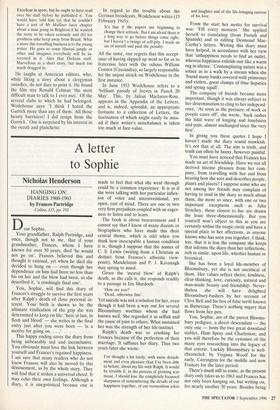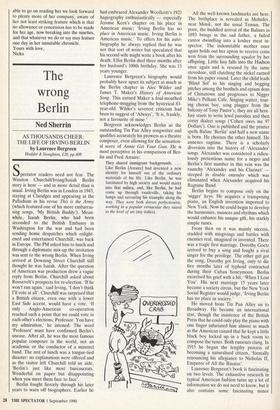A letter to Sophie
Nicholas Henderson
HANGING ON: DIARIES 1960-1963 by Frances Partridge
Collins, £15, pp. 192
Dear Sophie, Your grandfather, Ralph Partridge, said once, though not to me, that if your grandmother, Frances, whom I have known for over 50 years, died 'he would not go on'. Frances believed this and thought it rational, yet when he died she decided to hang on — even though her dependence on him had been no less than his on her and the blow had been, as she described it, 'a crushingly final one'.
You, Sophie, will find this diary of Frances's struggle to survive the first years after Ralph's death of close personal in- terest. Your birth is shown to be the ultimate vindication of the grip she was determined to keep on life: 'here at last, in flesh and blood' — she writes in the final entry just after you were born — 'is a motive for going on. . .
This happy ending saves the diary from being unbearably sad and inconclusive. You obviously must love the link between yourself and Frances's regained happiness. I am sure that many readers who do not know Frances will also be moved by this denouement, as by the whole story. They will find that it strikes a universal chord. It may echo their own feelings. Although a diary, it is unegotistical because one is made to feel that what she went through could be a common experience. It is as if she were talking with her particular inflex- ion of voice and unconventional, yet open, cast of mind. There are one or two very firm prejudices coupled with an eager- ness to listen and to learn.
The book is about bereavement and I cannot say that I know of many diarists or biographers who have made this their central theme, which is odd when you think how inescapable a human condition it is, though I suppose that the names of C. S. Lewis (writing from a Christian as distinct from Frances's atheistic view- point), Mandelstam and P. J. Kavanagh may spring to mind.
Given the 'mortal blow' of Ralph's death, as she calls it, she responds readily to a passage in Iris Murdoch:
'How are you?'
'Dead, otherwise fine'.
Yet suicide was not a solution for her, even though it had been a way out for several Bloomsbury worthies whom she had known well. She regarded it as selfish and' the cause of pain to others. What sustained her was the strength of her life-instinct.
Ralph's death was so crushing for Frances because of the perfection of their marriage. It suffuses her diary. Thus two years later she wrote:
I've thought a lot lately, with more detach- ment and even pleasure than I've been able to before, about my life with Ralph. It would be terrible if, in the process of growing scar tissue, I should lose the completely focussed sharpness of remembering the details of our happiness together, of our tremendous jokes and laughter and of the life-bringing current of his love.
From the start her motto for survival was: 'Fill every moment.' She applied herself to translating (from French and Spanish) and to editing Desmond Mac- Carthy's letters. Writing this diary must have helped, in accordance with her view that 'unhappiness needs to find an outlet, whereas happiness enfolds one like a warm rug in silence.' Contemplating nature was a solace as in a walk by a stream when she 'found many banks covered with primroses and violets, great clumps of blue hepatica and spring squill'.
The company of friends became more important, though it was always subject to her determination to cling to her independ- ence. 'As soon as the pressure of work or people eases off, she wrote, 'back rushes the tidal wave of longing and loneliness and pain, almost unchanged since the very first'.
In giving you these quotes I hope I haven't made the diary sound mawkish. It's not that at all. The aim is truth, and truth can often be funny, however painful.
You must have noticed that Frances has made an art of friendship. Have we not all derived intense pleasure from her com- pany, from travelling with her and from hearing how she sees and describes people, plants and places? I suppose some who are not among her friends may complain of having to read in the diary so much about them, the more so since, with one or two important exceptions such as Julia Strachey, those closest to her are drawn the least three-dimensionally. But you yourself won't object to this as you are certainly within the magic circle and have a special place in her affections, as anyone knows who has seen you together. I think, too, that it is less the company she keeps that informs the diary than her reflections, rich in simile, upon life, whether human or botanical.
She has been a loyal life-member of Bloomsbury, yet she is not uncritical of them. Her values reflect theirs; kindness, clear-thinking, love, curiosity, natural and man-made beauty and friendship. Never- theless she will have delighted Bloomsbury-bashers by her account of Clive Bell and his box of false teeth known as Buttercup. There's nothing sugary that flows from her pen.
You, Sophie, are of the purest Blooms- bury pedigree, a direct descendant — the only one — from the two great downland stables, Ham Spray and Charleston; and you will therefore be the cynosure of the many eyes researching into the legacy of that coterie. Luckily Bloomsbury is well- chronicled: by Virginia Woolf for the early, Carrington for the middle and now Frances for the later period.
There's much still to come, as the present diary only takes us to 1963 and Frances has not only been hanging on, but writing on, for nearly another 30 years. Besides being able to go on reading her we look forward to plenty more of her company, aware of her not least striking feature which is that no allowance or concession has to be made for her age, now breaking into the nineties, and that whatever we do or say may feature one day in her inimitable chronicle.
Yours with love, Nicko



















































 Previous page
Previous page